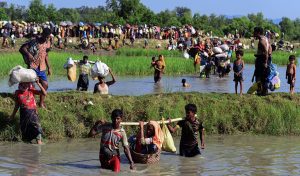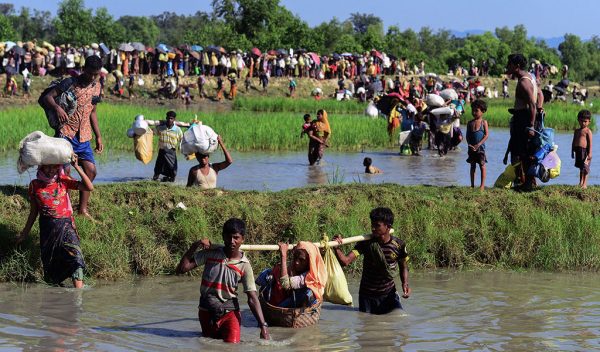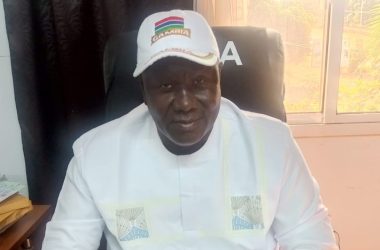The International Court of Justice has ruled against Myanmar’s request for a 10-month extension for the filing of a counter-memorial against The Gambia in the Rohingya genocide case, according to a ruling published recently.
In an order dated 22 July 2022, the Court fixed 24 April 2023 as the time limit for the filing of the counter-memorial of the Republic of the Union of Myanmar.
However, by a letter dated 14 March 2023, Myanmar requested the Court to extend the time limit for the filing of the Counter-Memorial to 24 February 2024, stating that such an extension was necessary for a number of reasons, including, inter alia, the voluminous nature of the memorial of the Republic of The Gambia, as well as the time needed for the translation into the language of Myanmar or into English of the case-related documents.
Myanmar further explained that the resources at Myanmar’s disposal to conduct the case were limited and that the requirement that it submit six-monthly reports on its implementation of the provisional measures ordered by the Court placed other substantial demands on those resources.
Further, the representative of Myanmar indicated that Myanmar’s ability to work on the counter-memorial was affected by factors such as the change in Government in February 2021 and ongoing restrictions relating to the COVID-19 pandemic.
The Myanmar agent contended that his Government needed more time in order to take statements from (Rohingya) witnesses who have been living in camps in Bangladesh or would soon be repatriated to Myanmar.
Upon receipt of this letter, the registrar of the Court transmitted a copy thereof to the representative of The Gambia, in accordance with Article 44, paragraph 3, of the Rules of Court, and in a letter dated 21 March 2023, the representative of The Gambia stated that Government of The Gambia opposed the request of Myanmar, arguing in particular that if The Gambia had been able to produce its extensive memorial in nine months, there was no reason why Myanmar should not be able to prepare its counter-memorial within the time-limit of 24 April 2023, especially since Myanmar had had cognizance of The Gambia’s memorial for a total of 29 months.
It was further argued that there was, moreover, no precedent of the Court extending a time limit for the filing of a pleading because case-related documents needed to be translated or because of a party’s economic status.
The Gambia argued that Myanmar should not benefit from additional time for the preparation of its counter-memorial on the basis that resources were needed for the elaboration of its reports on the implementation of the provisional measures.
Moreover, it was contended that the Government of Myanmar should not be allowed to further delay the proceedings because of its own military coup or because of COVID-19-related public health issues.
Finally, The Gambia submitted that, as acknowledged by the respondent (Myanmar), there was little chance of Bangladesh allowing Myanmar to access witnesses currently living in camps in Bangladesh, or it was unlikely, given prevailing conditions, that any Rohingya refugees would soon return to Myanmar.
Thus, taking into account the views of the parties (The Gambia and Myanmar), the court refused Myanmar a 10-month extension and granted only a month’s extension, therefore scheduling the time limit for the filing of counter-memorial for 24 May 2023.
The Rohingya genocide case has been dragging before the court for three to four years now amidst delay by the respondent Myanmar.
It would be recalled that The Gambia government, through its legal arm headed then by Ba Tambedou, the then Attorney General and Minister of Justice, who has also served as a special assistant to the prosecutor at the International Criminal Tribunal for Rwanda, with the support of the Organisation of Islamic Conference (OIC) in May 2018 started a campaign against the Myanmar government.
This led to the eventual institution of proceedings by The Gambia to the International Court of Justice (ICJ) – the United Nations’ highest legal body and one of the most powerful and influential legal entities in the world – on 11 November 2019 against Myanmar concerning alleged violations of the Convention on the Prevention and Punishment of the Crime of Genocide of 9 December 1948, otherwise known as the Genocide Convention, to which both The Gambia and Myanmar are parties.
As basis for the Court’s jurisdiction, the applicant (Gambia) invokes Article IX of the Genocide Convention.
A 46-page application was tendered to the ICJ by The Gambia, which alleges that Myanmar has committed mass murder, arson, rape, gang rape, torture, enforced disappearance, sexual violence, burning down of Rohingya homes, mosques, madrassas, shops and Qur’ans and destruction of Rohingya occupied communities and a set of other grave crimes.
The Gambia contends that Myanmar has adopted, taken and condoned acts that are intended to destroy, in whole or in part “the Rohingya group, a distinct ethnic, racial and religious group that resides primarily in Myanmar’s Rakhine State”.
In particular, The Gambia asserts that in October 2016, the Myanmar military and other Myanmar security forces began widespread and systematic “clearance operations” that “intended to destroy the Rohingya as a group, in whole or in part, by the use of mass murder, rape and other forms of sexual violence, as well as the systematic destruction by fire of their villages, often with inhabitants locked inside burning houses”.
The government of Myanmar has denied any wrongdoing, but several research and investigations by reputable human rights organisation such as Human Rights Watch and Amnesty International have supposedly found out the cleansing of the Rohingya by the military which was highly supported and backed by the Myanmar government.
This move of instituting a lawsuit against Myanmar by The Gambia was record-breaking history as it was the first time in about 70 years that a state not connected to a crime filed against another state, and was, thus, hailed by many including a renowned Myanmarese rights activist Ro Nay San Lwin, co-founder of the Free Rohingya Coalition.

Not only that, it was not even a neighbouring state or a regional power that was trying to show its might that sued Myanmar, but a small country more than 7,000 miles away.
In January 2020, the International Court issued provisional measures ordering Myanmar to take certain actions to protect the Rohingya from genocide and preserve evidence of genocidal acts by perpetrators – the Myanmar security personnel.
Following the filing of the suit by The Gambia, the then leader of Myanmar, Aung San Suu Kyi, now 77, personally represented her country at the court, but she was ousted in a coup in February 2021 by the Myanmar military – which she defended from allegations of massive human rights violations – slapped with series of charges and detained under house arrest.
She now faces 33 years of jail term following the strings of charges that include corruption, illegal possession of a walkie-talkie, and flouting of Covid-19 restrictions.
If The Gambia wins the legal battle, the International Court of Justice would impose heavy punishment on the perpetrators, order the compensation for affected Rohingya victims, an immediate stop to the crimes and no further violations against the Rohingya Muslims, as The Gambia has demanded.
The military junta in Myanmar has since taken up the legal battle to face The Gambia in the already-protracted case and is set to file a counter-memorial.
Memorial is a written submission or the written arguments of parties in a trial that the parties prepare to contain details such as the cases and books referred to, statements of jurisdictions, arguments of the parties, facts of the case, and the prayer.





